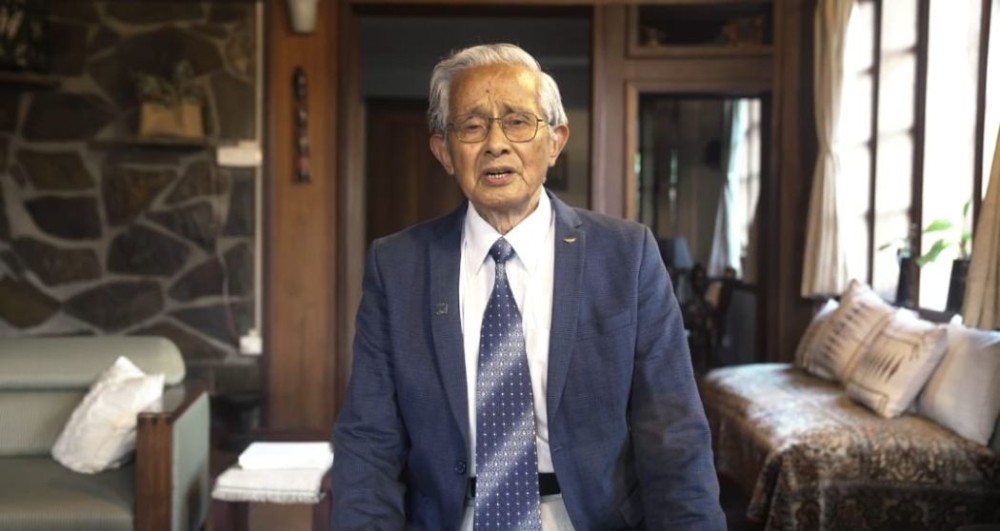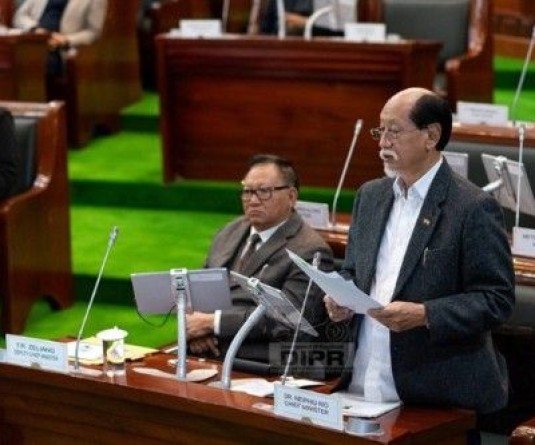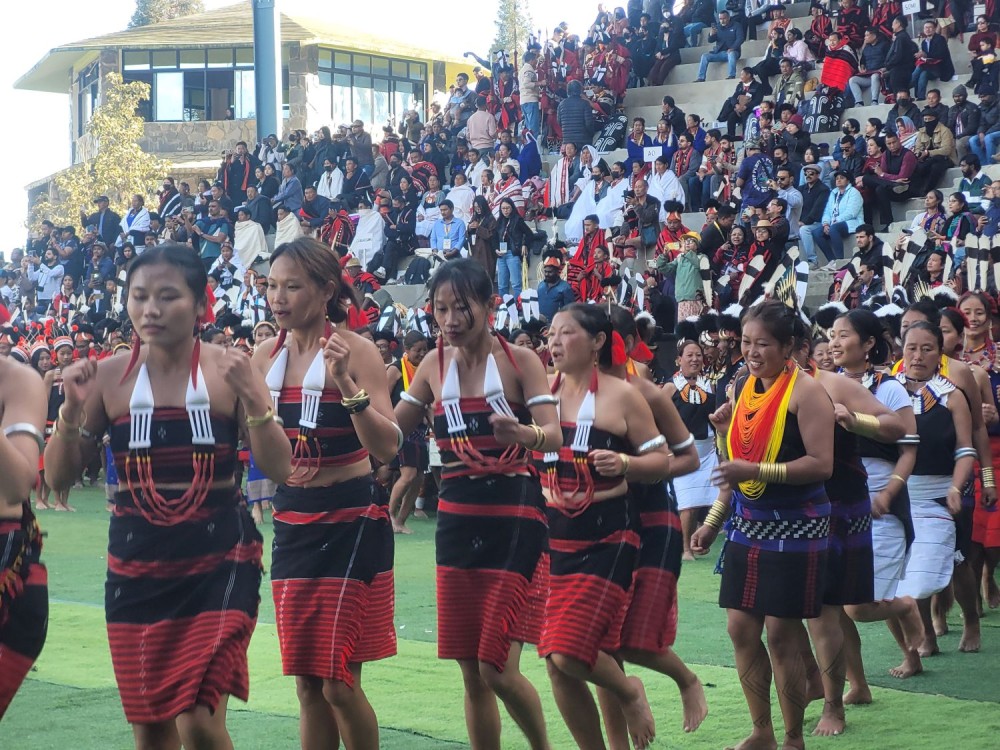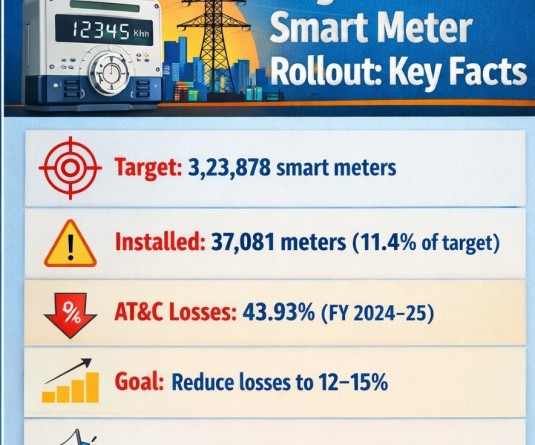Naga peacebuilder Niketu Iralu addressing the Trustbuilding Lifetime Achievement Award ceremony through a recorded video message from Kohima.

Denied South African visa for award event
Morung Express News
Kohima | November 12
Naga peacebuilder and thinker Niketu Iralu was denied a visa to travel to South Africa, where he had been invited to receive the International Lifetime Achievement Award for his decades-long contribution to peace and reconciliation.
The 2025 Annual Lecture and Trustbuilding Awards Ceremony, held at the University of South Africa, Pretoria, under the theme “Personal to Global Trustbuilding: Healing Begins at Home,” was hosted by Initiatives of Change South Africa in collaboration with Initiatives of Change (IofC) International on November 12.
The programme recognises outstanding individuals and organisations working to promote trust, reconciliation, and global understanding.
Iralu was named the Lifetime Achiever Award recipient for his lifelong commitment to peacebuilding and reconciliation efforts.
Speaking to The Morung Express, Iralu said he was puzzled by the visa denial, especially since a colleague who applied at the same time received his visa within two days.
“I don’t know what happened. The South African High Commission in Delhi said my application had been sent to their Home Ministry for clearance. After waiting for about 14–15 days, they finally informed me that my visa was denied,” he said.
According to Iralu, officials cited issues related to his bank statement, though he found the explanation “unclear and unconvincing.”
“They said there was something they could not understand in my bank statement,” he said with a hint of irony. “I told myself, I am sure I won’t make the South African government go bankrupt because of me.”
He speculated that the timing might have coincided with the upcoming BRICS Summit in Pretoria, which will see the participation of world leaders, including India’s Prime Minister Narendra Modi.
“Maybe there was some instruction or extra caution because of the summit. But I am only speculating,” he added.
Iralu said this was the first time he had faced a visa denial despite having travelled to many countries before. “If they checked my record, they would see I have never applied for anything suspicious,” he said.
He added that attempts to reach the South African High Commissioner in Delhi were unsuccessful. “The High Commissioner is an Indian-origin academic from South Africa, but we couldn’t reach him at all. Something went wrong somewhere,” he remarked.
Despite the setback, Iralu remained calm and reflective.
“We must not be wrongly treated in ways we don’t deserve. I am waiting to know the truth — maybe in the coming days I will have some information,” he said. When asked about the award, he responded with characteristic humility- “I take this award as a symbolic recognition for all of us. It is an honour we must carry forward together.”
From the mid-1950s, Niketu, who will turn 90 this year, served selflessly on every continent with Moral Re-Armament/Initiatives of Change. While reaching out to humanity, he also remained committed to his own people, their aspirations and identity, and true to his convictions and his conscience.
‘Trustbuilding begins with self’
Niketu Iralu, in his address accepting the International Lifetime Achievement Award for Trustbuilding, said that true change and peace must begin within oneself and be guided by moral conviction and humility.
In his recorded message for the 2025 Trustbuilding Awards Ceremony held at the University of South Africa, Pretoria, Iralu expressed gratitude and reflected on his seven-decade peace journey in Northeast India.
Recalling his formative years, Iralu said his encounter with the Initiatives of Change movement, known then as Moral Re-Armament, during his student days at Madras Christian College in 1955, profoundly shaped his worldview.
“I was immediately captivated by its aim to remake the world by first accepting the needed changes in myself. I realised that the greatest service I could render to myself and my people was to give my life to God, for Him to change, fill, and guide me,” he said.
Speaking about the challenges of the region, Iralu highlighted the complex ethnic mosaic of Northeast India, home to more than 220 tribes and ethnic nationalities whose kinship extends across neighbouring countries including China, Myanmar, and Bangladesh.
“The international boundaries were drawn by the British Empire from faraway Delhi, without the knowledge or consent of these ethnic peoples,” he observed. “Today, their awakened aspirations sometimes clash with neighbours on all sides. Unless we create a common stability for our common good, the killing fields of Southeast Asia could extend into our entire region.”
Iralu emphasised that his lifelong mission has been to nurture trust and reconciliation among divided communities.
“Conscious of this real possibility, we are striving to create this stability. My personal commitment, and that of those working with me, is to nurture a growing trust that has already begun to take root,” he said. “By strengthening this trust, we are finding ways to confront our common crises.”
He noted that the work of trustbuilding demands introspection, humility and courage to acknowledge one’s own part in conflicts.
“Our work has taught us that restitution and reconciliation become possible when we go beyond seeing only where others have hurt us, and are ready to see where we may have provoked them to hurt us,” he said. “Then, forgiving, and being forgiven, becomes possible.”






